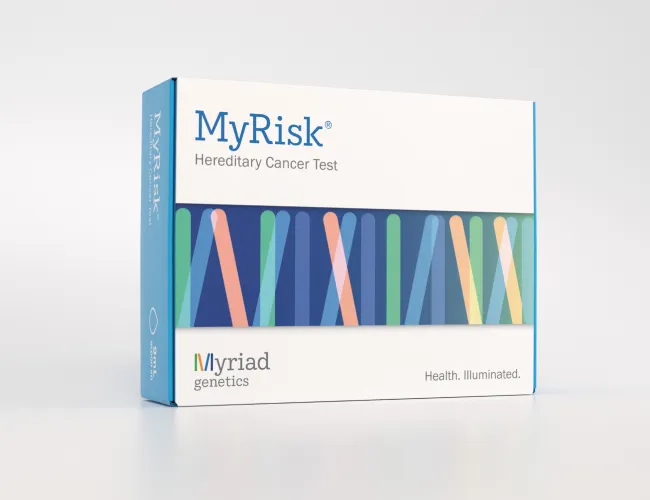
Hereditary Cancer Test
This cancer screening panel looks for genetic changes that increase the risk for many types of cancer. The panel analyzes 63 genes, including BRCA1 and BRCA2, that are related to hereditary cancer.

- About 1 in 8 women will be diagnosed with breast cancer in their lifetime, making it one of the most common cancers. Men can also carry BRCA gene mutations.
- Risk of breast, ovarian, and other cancers is significantly increased in people with BRCA gene mutations.
- Knowing your risks can empower you and your doctor to create a personalized healthcare plan to optimize prevention, early detection, and treatment.
- If you have a family history of cancer, this test is especially important.
Who should consider taking this test?
Anyone interested in learning more about their personal health risk can get tested. The panel is designed for individuals of all ancestries and includes hereditary cancer risks found in people of all different backgrounds.
Testing is especially important for individuals with a personal and/or family history of cancer and those with Ashkenazi Jewish ancestry.
While the test is available to anyone age 18 or older, we often recommend waiting until approximately age 25 depending on family history and other factors.
How long will it take to get results?
Your kit should arrive 7-10 business days after you complete all registration forms. Test results are provided in an easy to understand report typically available within 3-4 weeks of the sample arriving at the lab. You will have an opportunity to discuss your results with a genetic counselor.
Will genetic testing be covered by my insurance?
Insurance coverage largely depends on whether your personal and family history of cancer meets established medical guidelines (clinical criteria). For those who meet criteria, 95% of private insurance companies cover testing and 90% of tested customers pay $0 out-of-pocket through coverage and financial assistance (Myriad Genetics data).
If you do not have insurance coverage or you have a high unmet deductible, you can choose to forgo insurance and opt for the self-pay price of $249 for your test. If you cannot afford testing, there are financial assistance programs available for those who qualify.
Clear cost estimates from Myriad Genetics
1. Self-pay: $298.00 due now. Nothing is billed to insurance.
2. Insurance: $49.00 due now, the rest is billed to your insurance. After Myriad Genetics receives your sample, they will provide you with a cost estimate.
Your estimate will consider:
- Your personal and/or family history of cancer
- Your insurance plan
- Your remaining deductible
- Any copays or coinsurance per your plan
- Eligibility for financial assistance
You will receive an email/text from Myriad Genetics notifying you that your estimate is ready to view. If your estimate shows you’ll have an out-of-pocket cost that creates a hardship, you have options which will be provided to you.


What to Expect
Actionable
The hereditary cancer test includes an easy to understand report with actionable results that will inform a personalized care plan. The test evaluates 63 genes to help identify the risk of 11 different types of hereditary cancer, including breast, colon, and pancreatic cancer.
Affordable
We are committed to providing you with access to reliable and affordable genetic testing. Cancer genetic testing is covered by most insurance plans, for those who meet certain criteria, and Myriad Genetics offers the option of affordable cash pay prices and financial assistance programs for those who qualify.
Peace of mind
In addition to providing results for the 63 genes tested, a genetic counseling session, a personalized care plan, and a breast cancer risk score for eligible individuals is provided. After your genetic counseling appointment, you will have a clear understanding of your results, an assessment of your risks, and a well-defined plan for your next step.






